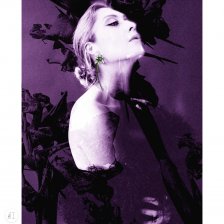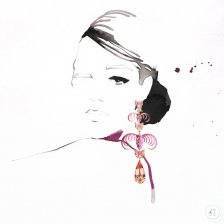SOLITARY CRAB: AN INTERVIEW WITH GBEMILEKE ADEKUNLE
My works navigate between the physical and mental states of mind, with figurative compositions offering a visual retrospect of struggle, resilience, and the yearning for meaning within a fractured society.
Gbemileke Adekunle
In and through his paintings, Gbemileke Adekunle, also known as Solitary Crab, explores themes of solitude, heritage, physical and mental states of mind, struggle, resilience, meaning of life, and the human condition.
Born in 1991 in Ajilete, a village in southwestern Nigeria, Gbemileke's artistic journey was nurtured from a young age by his parents, who were passionate about art.
His art, characterized by its expressionist roots, with a tendency towards abstract expressionism in his more recent works, goes deep into the complexities of human emotions and experiences.
Gbemileke’s use of acrylics, complemented by oil pastel and charcoal (a nod to his childhood, where he first experimented with drawing using burnt wood and crayons), creates thought-provoking and visually engaging textured canvases.
Through his work, Gbemileke invites viewers to reflect on their own experiences and the human psyche, making his art both a personal story and a universal exploration into the many complexities of life.
Read the full interview with the artist.
Art is the reflection of the inner mind. It juggles between emotion, intuition, obsession and religion.
Gbemileke Adekunle
The JI: What is art for you?
Gbemileke: Art is the reflection of the inner mind. It juggles between emotion, intuition, obsession and religion.
The JI: What is love for you?
Gbemileke: Love is acceptance. It is devotion and meditation with the essence of infinite cosmic flow.
The JI: What is freedom for you?
Gbemileke: I believe freedom is openness, a liberation from norms, standards while questing for a higher consciousness.
The JI: What is the most important quality in a person without which you would not want to build a relationship?
Gbemileke: Honestly and being a human.
Conceptual works or that of psychological significance are considered done at the verge of physical and mental acceptance.
Gbemileke Adekunle
The JI: How do you know when your artwork is finished? When you look at it and feel, or see, or think: yes, this is what I've been aiming for.
Gbemileke: An artwork is never finished.
If it is about aesthetics, there’s always an infinite passion for enhancement and improvement.
Conceptual works or that of psychological significance are considered done at the verge of physical and mental acceptance.
The JI: What do you think: what is the artist's role in society? Do you think that art has a social responsibility?
Gbemileke: Every art has its purpose. An artwork tends to fulfil social functions if it’s socially driven.
The JI: What’s the most ridiculous or the funniest misconception about being an artist?
Gbemileke: That an artist is a mystical being. That an artist needs to be high on some substance before getting inspired. And the list goes on and on.
My art is a reflection of myself. These are the visual retrospects of my ordeals and the unknown.
Gbemileke Adekunle
The JI: If you could choose one of your dreams – the happiest, the scariest, the funniest, the oddest – and transform it into a piece of art, what would that be? And what would it look (feel, smell, taste, touch) like?
Gbemileke: My art is a reflection of myself. These are the visual retrospects of my ordeals and the unknown. My dreams are my fears; they haunt me. I bring these forth into dialogue through my works. It’s impossible for me to embellish these emotions in a single piece of art. Maybe in the future, I hope.
The JI: What would you say is your life philosophy? And how does it influence your artistic expression?
Gbemileke: My philosophy about life is finding the essence of existence. I’m a big fan of Charles Bukowski. So there goes his quote: “find what you love and let it kill you…”
My works are rendered unapologetically. They often question the realities of my existence.
Emotive arts deeply rely on human experience and feelings. But it is needless to submit oneself to dark matters in the process of making art.
Gbemileke Adekunle
The JI: Art is a very personal affair. Through art we reveal our innermost perceptions about the world, people, feelings, justice, ourselves. How do you deal with vulnerability in sharing your personal experiences or thoughts through your paintings?
Gbemileke: My works navigate between the physical and mental states of mind, with figurative compositions offering a visual retrospect of struggle, resilience, and the yearning for meaning within a fractured society.
I embrace meditation, devotion and retribution in a quest to fortify the shared and unshared human experiences.
The JI: For many people, art is associated with extreme emotions and experiences. Do you think suffering or hardship is necessary to create? What are your driving emotions in the process of creation?
Gbemileke: Emotive arts deeply rely on human experience and feelings. But it is needless to submit oneself to dark matters in the process of making art.
Subconsciously, I have submitted myself to the sway of my psyche. I had seen a transition from cultural affinities to mundaneness, and later to sadness.














